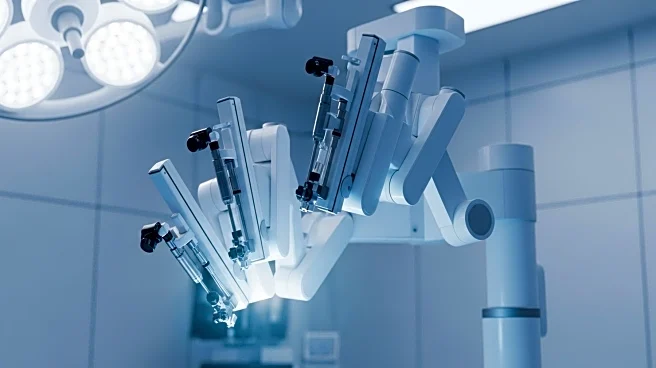What's Happening?
B. Braun has acquired True Digital Surgery, a company specializing in digital, robotic-assisted 3D surgical microscopy. This acquisition aims to advance B. Braun's Aesculap Aeos robotic digital microscope technology. True Digital Surgery, originally founded as TrueVision Systems in 2003, has developed a digital imaging system designed to overcome limitations of traditional ocular microscopes, such as equipment size and the need for surgeons to use eyepieces. The acquisition will allow True Digital Surgery to continue innovating and integrating advanced technologies at its existing site in California. B. Braun previously held a minority stake in the company, and the terms of the deal have not been disclosed.
Why It's Important?
The acquisition is significant as it reflects a shift in the high-end microsurgery market, particularly in neuro, spine, and ear, nose, and throat procedures, from traditional analog microscopes to digital exoscopes. These digital systems provide enhanced visualization and allow surgeons to operate while viewing 3D monitors, potentially reducing physical strain associated with traditional microscopes. This technological advancement could address ergonomic issues that have historically led to musculoskeletal disorders among surgeons, impacting their career longevity. The move by B. Braun could set a precedent for other companies in the surgical equipment industry to adopt similar technologies, potentially improving surgical outcomes and reducing healthcare costs associated with surgeon fatigue.
What's Next?
B. Braun plans to maintain True Digital Surgery as a technology hub, focusing on further innovation in digital microscopy. As the market for surgical exoscopes grows, competition among companies like Carl Zeiss Meditec, Leica Microsystems, and Olympus is expected to intensify. The adoption of digital exoscopes may increase as more surgeons recognize the benefits of reduced fatigue and improved image quality. However, the high cost of these devices, which can reach up to $1.5 million, remains a barrier to widespread adoption. Future developments may focus on reducing costs and improving accessibility to these advanced surgical tools.
Beyond the Headlines
The shift to digital exoscopes may have broader implications for surgical training and education, as new technologies require updated curricula and training programs. Additionally, the ergonomic benefits of digital exoscopes could lead to changes in workplace policies and healthcare standards, emphasizing the importance of surgeon well-being. As technology continues to evolve, ethical considerations regarding the use of robotics and AI in surgery may also arise, prompting discussions on the balance between human expertise and technological assistance.










